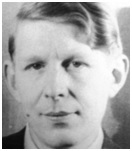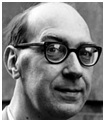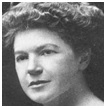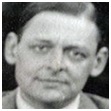|
 |
|
 |
Poetry - Time Management
John Dryden (1631-1700), Happy the Man
(1685) Happiness is making the most of your time, says the English poet (pictured right):
Happy the man, and happy he alone, He who can call today his own: He who, secure within, can say, Tomorrow do thy worst, for I have lived today. (first four lines)
Ezra Pound (1885-1972), And the Days Are Not Full Enough
(1926) The American poet (pictured right) points out the danger of life slipping away without great effect:
And the days are not full enough And the nights are not full enough And life slips by like a field mouse Not shaking the grass. (complete poem)
Piet Hein (1905-96), T.T.T. The Danish poet (pictured right) says there are some things you can't rush.
When you feel how depressingly slowly you climb, it's well to remember that Things Take Time. (last verse)
John Milton (1608-74), How Soon Hath Time
(1632) Written on his 24th birthday, the English poet (pictured right) comments on the inevitable passing of time (“the subtle thief of time”, first line). But time is given purpose by following the will of God ( “my great Taskmaster”,last line). In God's service anything is worthwhile, “however mean [i.e.menial] or
high [important]” - see the third line below. Yet be it less or more, or soon or slow, It shall be still in strictest measure even To that same lot, however mean or high, Toward which Time leads me, and the will of Heaven; All is, if I have grace to use it so, As ever in my great Taskmaster’s eye. (lines 9-14)
Emily Dickinson (1830-86), They Say That ‘Time Assuages’
(1864) The American poet (pictured right) says the passage of time doesn't solve a problem, except that it may reveal that it wasn't a problem at all.
They say that 'time assuages,' - Time never did assuage; An actual suffering strengthens, As sinews do, with age.
Time is a test of trouble, But not a remedy. If such it prove, it prove too There was no malady. (complete poem)
W.H. Auden (1907-73), As I Walked Out One Evening
(1937) The English poet (pictured right) says you can't stop (or conquer) time.
But all the clocks in the city Began to whirr and chime: O let not Time deceive you, You cannot conquer Time. (verse 6)
Philip Larkin (1922-85), Days (1953) The English poet (pictured right) says we live in days, so we must be happy in them:
They are to be happy in: Where can we live but days? (last two lines)
Ella Wheeler Wilcox (1850-1919), Life Is Too Short (1883) The American poet (pictured right) says we must make the most of life (full of “high endeavour” , line 1)
Life is too short for aught but high endeavour,--- Too short for spite, but long enough for love. And love lives on for ever and for ever, It links the worlds that circle on above; 'Tis God's first law, the universe's lever, In His vast realm the radiant souls sigh never "Life is too short." (last verse)
T.S.Eliot (1888-1965), Burnt Norton (1935) The American- born British poet (pictured right) emphasizes the connection between the past, present and future: Time present and time past Are both perhaps present in time future And time future contained in time past.
T.S. Eliot, East Coker (1940) Eliot says perserverance and resolution are vital for success: Only through time time is conquered.
|
|
|
||
|
|
|
||
|
||
| Copyright © wisdomtowin.com All Rights Reserved | ||
|










